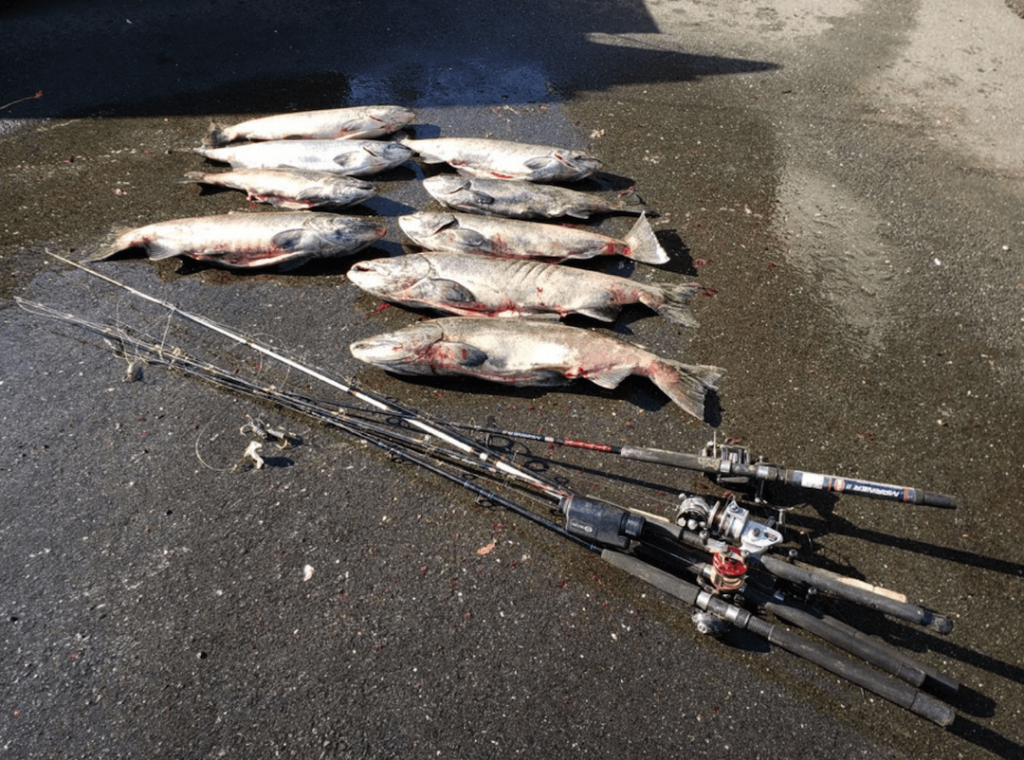
3 Elk River Chinook Snaggers Sentenced
Three salmon snaggers were sentenced to pay a total of $8,450 in restitution, serve 15 to 30 days in jail each and they can’t fish for three years after pleading to or being found guilty of illegally fishing for Chinook and other violations on Oregon’s Elk River, home to a critical king stock.

According to the Oregon State Police Fish and Wildlife Division’s August newsletter, Daniel Knapp, Miranda Wagner and Joseph Gish were busted leaving the lower river around 10 p.m. one night last November after an OSP pilot looking for spotlighters in the surrounding hills saw their flashlights along a closed section of the Elk where it flows into the ocean, between Port Orford and Cape Blanco south of Coos Bay.
Troopers responding to the scene stopped their pickup as it left the beach and discovered nine Chinook in the bed, along with six fishing rods and a night vision scope.

An OSP photo shows what appear to be lead-wrapped trebles rigged on the rods. Troopers say they had been casting for about half an hour.
The poaching occurred during a year of low salmon returns for most streams on the Oregon Coast and which led to reduced bag limits on wild fall kings.
Additionally, state fishery managers are very concerned about the numbers of wild Elk River kings, a population deemed “non-viable” under the Oregon Department of Fish and Wildlife’s 2014 management plan which seeks to reduce hatchery straying, estimated at the time to be greater than 60 percent. ODFW’s June 2016 hatchery genetic management plan for the facility on the Elk shows pHOS, or proportion of hatchery-origin fall Chinook on natural spawning grounds, rates from 2000 through 2015 as high as 78 percent in 2010 to as low as 26 percent in 2005, with the average 51.3125 percent
Last fall until early December, the Elk was also under a low-flow closure from the Highway 101 bridge down to Swamp Creek on the beach.
With few exceptions, salmon and other fishing is closed from an hour after sunset to an hour before sunrise, per ODFW regulations.
OSP’s monthly newsletter only sometimes identifies subjects who have been sentenced for fish and wildlife crimes, a review of this year’s issues show, suggesting the Elk River trio’s violations rose to a certain level and to serve as a deterrent to others.
According to troopers, Knapp and Wagner pled guilty to angling on closed waters, during prohibited hours and using prohibited methods, while Gish was found guilty of those charges.
Additionally, Gish was found guilty of not having a license and exceeding the limit.
Wagner was ordered to pay $4,500 in restitution to ODFW, Knapp $2,250 and Gish $1,500.
Gish received the longest jail term, 30 days, and probation, three years. Wagner and Knapp got 15 and two years.
The trio were also ordered to pay a total of $660 in fines.
Troopers were able to donate the Chinook to deserving people.
